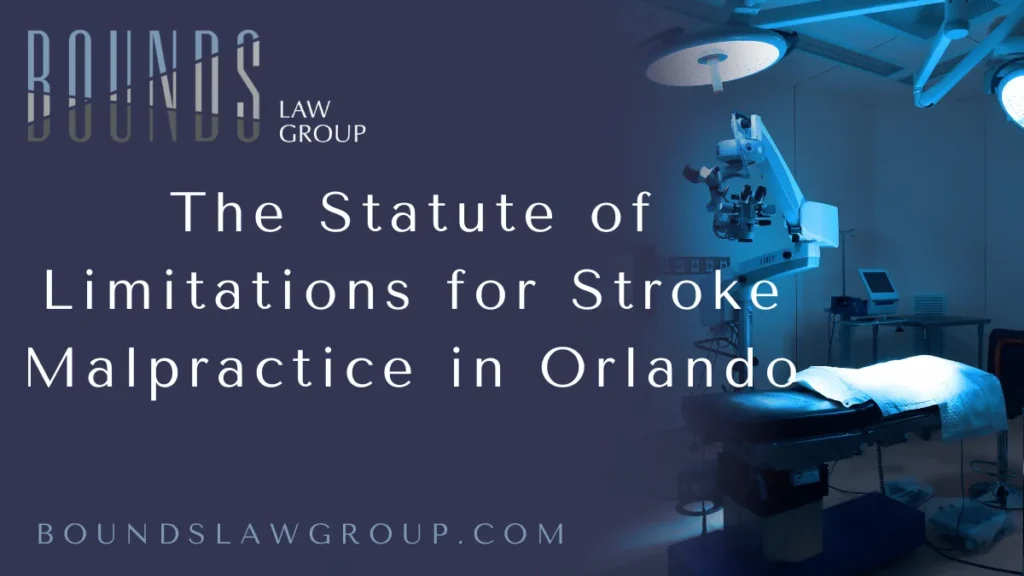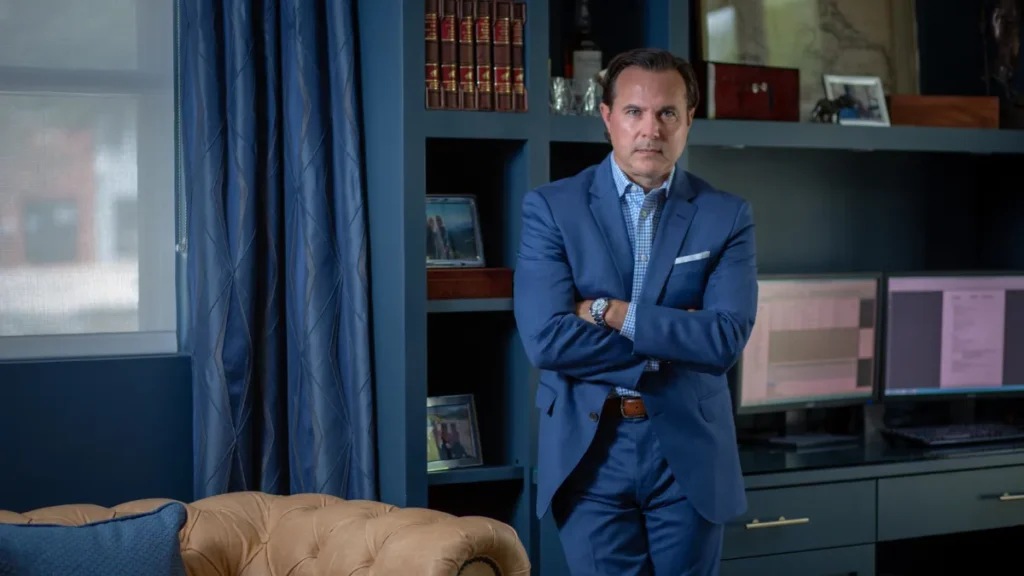
Stroke Malpractice Statute of Limitations in Orlando | Bounds Law Group
When a patient suffers a stroke due to medical negligence or experiences worsened outcomes from a delayed diagnosis or improper treatment, the aftermath can be devastating. At Bounds Law Group, we understand that stroke malpractice can be life-altering. But justice depends not only on the facts of the case—it also hinges on timing. Knowing the stroke malpractice statute of limitations in Orlando is crucial to protecting your legal rights and securing compensation.
Contact us now at 877-644-5122 or complete the free case evaluation form for expert legal assistance.
The Stroke Malpractice Statute of Limitations in Orlando
In Orlando, and across the state of Florida, medical malpractice lawsuits—including those involving strokes—are governed by strict statutory deadlines. These deadlines are known as the statute of limitations, and missing them can permanently bar you from pursuing legal action.
According to Florida Statutes § 95.11(4)(b), the general rule is that a medical malpractice claim must be filed within two years from the date the incident occurred, or from the time the patient (or their representative) knew or should have known that the injury occurred and that it may have been caused by medical negligence.
For stroke malpractice cases, this typically means:
- Two years from the date of the misdiagnosis or negligent treatment, or
- Two years from when the patient discovered, or reasonably should have discovered, the injury was related to malpractice.
This discovery rule allows some flexibility in situations where the injury wasn’t immediately obvious—but that time still runs quickly.

Why Stroke Malpractice Often Falls Into the Gray Area of the Statute
Strokes are complex, and medical professionals must act quickly to diagnose and treat them. A delay of even minutes can mean the difference between full recovery and permanent disability. Medical errors involving strokes may include:
- Failure to diagnose a transient ischemic attack (TIA)
- Misinterpretation of CT or MRI scans
- Failure to administer tPA (tissue plasminogen activator) in time
- Delayed transfers to stroke-capable facilities
- Failure to recognize stroke symptoms in emergency rooms
Because symptoms may appear subtle or may be attributed to other conditions, the window to recognize malpractice is often narrow, making the stroke malpractice statute of limitations in Orlando especially critical.
The Four-Year Statute of Repose in Florida
Even if the discovery of malpractice is delayed, Florida law imposes a maximum deadline known as the statute of repose. This rule sets an absolute four-year limit from the date of the actual malpractice, regardless of when it was discovered. The only exception is in cases of fraudulent concealment, where a healthcare provider intentionally hid the wrongdoing. In such rare cases, the deadline may be extended to seven years.
This means that if you or your loved one experienced a stroke caused by medical negligence, you must act quickly. Time is not on your side.
Stroke Malpractice Involving Minors in Orlando
In cases where the victim of stroke malpractice is a minor child, the statute of limitations may differ. Florida law permits a medical malpractice action to be brought on behalf of a child up until the child’s eighth birthday, regardless of when the malpractice occurred. This extended window acknowledges that medical errors in children may not be detected immediately.
However, if a stroke occurred during birth or shortly after, or if your child suffered lifelong disabilities due to delayed stroke treatment, it's imperative to speak with our legal team immediately.
Why Timing Is Crucial in Stroke Malpractice Lawsuits
Missing the stroke malpractice statute of limitations in Orlando is not just a procedural error—it can kill your case. Courts in Florida strictly enforce these deadlines. Even if you have compelling evidence and clear proof of negligence, you cannot file a claim after the statute has expired.
Additionally, medical malpractice claims in Florida require several pre-suit steps, such as:
- Obtaining a written medical expert opinion
- Sending a notice of intent to sue to the healthcare provider
- Engaging in a 90-day pre-suit investigation period
These steps consume valuable time, so early action is absolutely essential.
What To Do If You Suspect Stroke Malpractice in Orlando
If you or a loved one suffered a stroke and believe it was due to medical negligence, do not wait. Every day that passes could bring you closer to losing your legal right to compensation.
Here’s what you should do immediately:
- Gather all medical records relating to the stroke diagnosis and treatment.
- Make detailed notes of what happened before, during, and after the stroke.
- Consult with a qualified medical malpractice attorney to evaluate your case.
- Start the pre-suit process before the statute of limitations expires.
At Bounds Law Group, we specialize in complex medical malpractice cases, including those involving stroke misdiagnosis, delayed care, and negligent treatment.
How Bounds Law Group Can Help You Navigate the Statute of Limitations
Navigating the stroke malpractice statute of limitations in Orlando requires legal precision, speed, and expertise. Our team at Bounds Law Group works diligently to evaluate the timeline of events, consult with leading medical experts, and file your claim within all statutory deadlines.
We handle everything:
- Calculating the applicable statute of limitations
- Evaluating whether the discovery rule applies
- Determining eligibility for any extensions or exceptions
- Managing all pre-suit requirements
- Filing a strong and timely malpractice lawsuit
Secure Your Right to Compensation Before It’s Too Late
Victims of stroke malpractice often face a lifetime of challenges: physical disabilities, cognitive impairments, lost income, emotional trauma, and mounting medical bills. You deserve justice—and the law gives you a limited time to pursue it.
Don't let a missed deadline rob you of your future. Let Bounds Law Group help you hold negligent providers accountable and secure the compensation you need to move forward.
Complete our free case evaluation form and call us now at 877-644-5122. Our attorneys are ready to act fast and fight for your rights.

How Expert Medical Testimony Affects Stroke Malpractice Cases in Orlando
In any stroke malpractice case in Orlando, the role of expert medical testimony is not only important—it is legally required. Florida law mandates that a verified written medical opinion from a qualified expert must accompany any claim of medical negligence. This requirement is in place to prevent frivolous lawsuits, but it also adds another layer of complexity to your case—especially when dealing with the intricacies of stroke-related care.
At Bounds Law Group, we work closely with top-tier neurologists, emergency medicine specialists, and radiologists to evaluate whether the standard of care was breached. This means our experts review:
- Whether stroke symptoms were properly identified
- If critical diagnostic tests were ordered and interpreted correctly
- Whether appropriate treatments (such as tPA) were administered within the necessary time window
- Whether follow-up care met the accepted standards in the medical community
Because stroke cases are highly technical, judges and juries rely heavily on expert opinions to understand whether a provider’s actions deviated from the accepted standard. Without strong expert testimony, even the most obvious malpractice case can falter.
Our team ensures that:
- Experts are appropriately credentialed under Florida law
- Reports are thorough and persuasive
- Testimony is clear and compelling in court
This expert-driven strategy helps us build rock-solid stroke malpractice claims that stand up to scrutiny and increase your chances of a successful outcome.
If you suspect medical negligence played a role in a stroke diagnosis or treatment, don’t navigate these complex waters alone. Complete our free case evaluation form or call 877-644-5122 today to get started.
Sources
- Florida Statutes - Medical Malpractice (Section 95.11)
The official statute governing time limits for medical malpractice lawsuits in Florida.
https://www.flsenate.gov/Laws/Statutes/2023/95.11 - National Institute of Neurological Disorders and Stroke (NINDS)
Comprehensive resource for stroke symptoms, treatment, and prevention.
https://www.ninds.nih.gov/health-information/disorders/stroke - American Stroke Association
Offers resources and education on stroke diagnosis and treatment guidelines.
https://www.stroke.org

